-
RESEARCH01-01-2017
Alta prevalencia de enteroparasitosis en niños de Ribeirão Preto, São Paulo, Brasil
Revista Brasileira de Enfermagem. 2017;70(3):566-571
Abstract
RESEARCHAlta prevalencia de enteroparasitosis en niños de Ribeirão Preto, São Paulo, Brasil
Revista Brasileira de Enfermagem. 2017;70(3):566-571
-
RESEARCH01-01-2017
High prevalence of enteroparasites in children from Ribeirão Preto, São Paulo, Brazil
Revista Brasileira de Enfermagem. 2017;70(3):566-571
Abstract
RESEARCHHigh prevalence of enteroparasites in children from Ribeirão Preto, São Paulo, Brazil
Revista Brasileira de Enfermagem. 2017;70(3):566-571
DOI 10.1590/0034-7167-2016-0059
Views0See moreABSTRACT
Objective:
To determine the prevalence of intestinal parasites and possible associated factors.
Method:
Cross-sectional epidemiological study of 962 children (3-12-years) from an area within the scope of a basic health unit in Ribeirão Preto, São Paulo, Brazil. Data were collected by home interviews and three-sample stool analysis and evaluated with the chi-square and Fisher’s exact tests (p<0.05).
Results:
The prevalence of intestinal parasites was significantly high (57.5%). Giardia lamblia was the most prevalent (50.8%), followed by Ascaris lumbricoides (17.8%), Entamoeba histolytica, Hymenolepis nana, Entamoeba coli and Enterobius vermiculares (5.6-7.3%) and other parasites of lower prevalence, such as Schistosoma japonicum (1%) and Schistosoma mansoni (0.5%). No statistically significant associations were detected between prevalence and the risk factors analyzed.
Conclusion:
Since the area presents good conditions of environmental sanitation, health education programs should be implemented that emphasize hygiene procedures for the hands and for food and water to be consumed by the population.

-
RESEARCH01-01-2017
Validation of the adherence questionnaire for Brazilian chronic kidney disease patients under hemodialysis
Revista Brasileira de Enfermagem. 2017;70(3):558-565
Abstract
RESEARCHValidation of the adherence questionnaire for Brazilian chronic kidney disease patients under hemodialysis
Revista Brasileira de Enfermagem. 2017;70(3):558-565
DOI 10.1590/0034-7167-2016-0437
Views0ABSTRACT
Objective:
To validate the evaluation questionnaire on adherence of chronic kidney disease (CKD) patients under hemodialysis.
Method:
We verified the following psychometric properties of the instrument: reliability (stability and internal consistency) and validity (face, content, and construct).
Results:
The intraclass correlation coefficient reached a value of 0.98 for the adherence questions and 0.91 for the perception questions. Regarding the kappa of the 14 questions examined, 12 had a value > 0.8, whereas the Cronbach’s alpha had a value of 0.57. Experts ensured the face and content validity of the instrument, giving it an overall content validity index of 0.96. Construct validity, analyzed by Mann-Whitney test, was achieved as all domains showed a significant association with p<0.01.
Conclusion:
We verified, by the presented results, that the instrument has been validated for use in Brazil.
Keywords:Chronic Kidney DiseaseKidney DialysisMedication AdherenceNursing in NephrologyPatient CooperationSee more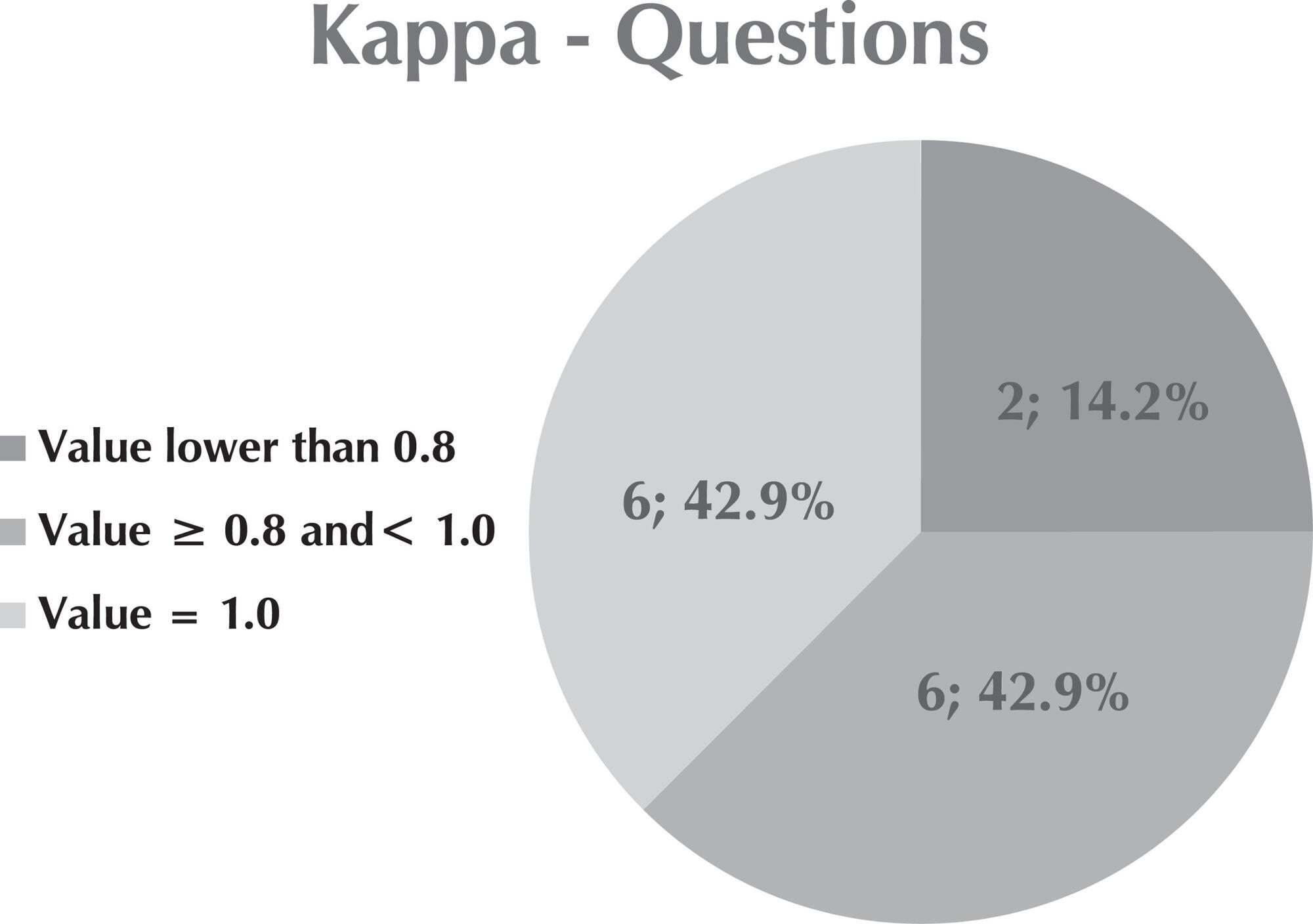
-
RESEARCH01-01-2017
The experience of rural families in the face of cancer
Revista Brasileira de Enfermagem. 2017;70(3):550-557
Abstract
RESEARCHThe experience of rural families in the face of cancer
Revista Brasileira de Enfermagem. 2017;70(3):550-557
DOI 10.1590/0034-7167-2016-0367
Views0See moreABSTRACT
Objective:
To understand the meanings of cancer within the experience of rural families and how such meanings influence family dynamics.
Method:
Qualitative study guided by Symbolic Interactionism as a theoretical framework and Grounded Theory as a methodological framework. Six rural families (18 participants) undergoing the experience of having a relative with cancer participated in the interview.
Results:
Constant comparative analysis of data allowed the elaboration of an explanatory substantive theory, defined by the main category Caregiving to support the family world, which represents the family’s symbolic actions and strategies to reconcile care for the patient and care for family life.
Final considerations:
Throughout the experience, rural families seek to preserve the interconnected symbolic elements that provide support for the family world: family unit, land, work and care.

-
RESEARCH01-01-2017
Contributions of Public Health to nursing practice
Revista Brasileira de Enfermagem. 2017;70(3):543-549
Abstract
RESEARCHContributions of Public Health to nursing practice
Revista Brasileira de Enfermagem. 2017;70(3):543-549
DOI 10.1590/0034-7167-2016-0401
Views0See moreABSTRACT
Objective:
Analyze the perceptions of undergraduate nursing students about the contributions of public health to nursing practice in the Unified Health System.
Method:
Qualitative Descriptive Study. Data collection was carried out through semi-directed interviews with 15 students. The language material was analyzed according to content and thematic analysis.
Results:
Thematic categories were established, namely: “Perceptions about Public Health” and “Contribution of Public Health to nursing practice in the Unified Health System”.
Final considerations:
Perceptions about Public Health are diversified, but converge to the recognition of this field as the basis for training nurses qualified to work in the SUS with technical competence, autonomy and focusing on the integrality in health care.
-
RESEARCH01-01-2017
Cancellation of elective surgeries in a Brazilian public hospital: reasons and estimated reduction
Revista Brasileira de Enfermagem. 2017;70(3):535-542
Abstract
RESEARCHCancellation of elective surgeries in a Brazilian public hospital: reasons and estimated reduction
Revista Brasileira de Enfermagem. 2017;70(3):535-542
DOI 10.1590/0034-7167-2016-0084
Views0ABSTRACT
Objective:
To characterize cancellations of elective surgeries according to clinical and non-clinical reasons, as well as to verify seasonal influence and determine the estimated reduction of the index.
Method:
Quantitative, descriptive and retrospective study with secondary data extracted from the Public Hospital of the State of São Paulo database.
Results:
Out of the 8,443 (100%) elective surgeries scheduled, 7,870 (93.21%) were performed and 573 (6.79%) were canceled. Out of these 573 (100%) people, 48.33% were canceled for clinical reasons and 46.40% were for non-clinical reasons. Among the non-clinical reasons for surgery cancellations, those related to medical reasons stood out: at the request of the surgeon/change of approach (17.93%), followed by non-hospitalized patient (8.96%). There was no indication of seasonality regarding the reasons for cancellation in the assessed period.
Conclusion:
Although the rate of elective surgeries cancellations is lower than that of other hospitals with similar characteristics, it is still possible to reduce it from 6.79% to 1.36%, considering that 80% of the reasons for cancellation are avoidable.
Keywords:Elective Surgical ProceduresHealth AssessmentHospital AdministrationHospital Surgical CenterPublic HospitalsSee more
-
RESEARCH01-01-2017
Guide of attributes of the nurse’s political competence: a methodological study
Revista Brasileira de Enfermagem. 2017;70(3):526-534
Abstract
RESEARCHGuide of attributes of the nurse’s political competence: a methodological study
Revista Brasileira de Enfermagem. 2017;70(3):526-534
DOI 10.1590/0034-7167-2016-0483
Views0ABSTRACT
Objective:
To build and validate a guide of attributes of the nurse’s political competence.
Method:
Methodological research. This study comprised the construction of the instrument through literature review; experts validation of pre-established attributes for composing the guide; and clinical validation in the nurses work environment/reality. The data collection took place in the months from August to October 2014, and the analysis was based on the content analysis of Bardin and use of Epi info 3.5. All ethical precepts have been complied with.
Results:
From 29 attributes found in the literature, 25 have been validated by experts. Clinical/practical validation involved the participation of 43 nurses, who observed that the attributes are not articulated with the professional practices developed by them.
Conclusion:
The attributes of the nurse’s political competence were identified with support of literature. It is concluded that the professionals still have limited and fragmented perception of political competence, expressing difficulty/limitation.
Keywords:Methodological Research in NursingNursingPoliticsProfessional CompetenceProfessional PracticeSee more -
RESEARCH01-01-2017
Promoting oral care in the preschool child: effects of a playful learning intervention
Revista Brasileira de Enfermagem. 2017;70(3):519-525
Abstract
RESEARCHPromoting oral care in the preschool child: effects of a playful learning intervention
Revista Brasileira de Enfermagem. 2017;70(3):519-525
DOI 10.1590/0034-7167-2016-0237
Views0See moreABSTRACT
Objective:
To compare the number of appropriate behaviors for tooth brushing before and after a playful learning intervention with preschool children.
Method:
A quasi-experimental, quantitative, before and after study design was conducted in an early childhood educational institution, with children between three and five years of age. The intervention consisted of three meetings with educational activities about tooth brushing, whose outcome was evaluated by means of observation of ten behaviors suitable for tooth brushing.
Results:
Forty-four children participated in the study. The mean of adequate behaviors was 4.4 before the intervention, and 8.5 after the intervention. A significant increase in the adoption of appropriate behaviors for tooth brushing (p <0.01) was identified.
Conclusion:
Nurses can enhance oral health promotion actions with preschoolers in preschool institution using playful learning interventions
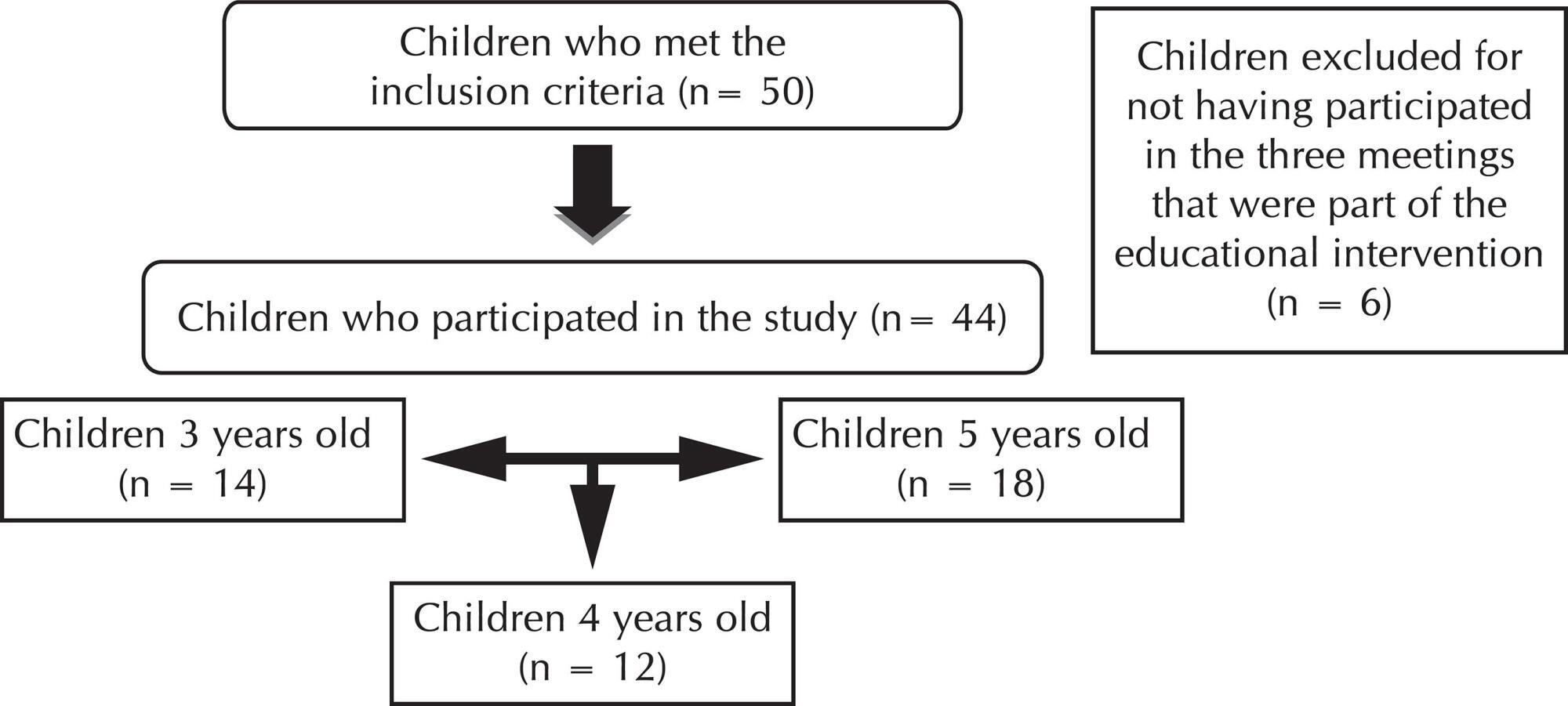
-
EDITORIAL08-19-2024
Sexual abuse, abortion and public health in Brazil: when moral judgment accentuates inequities
Revista Brasileira de Enfermagem. 2024;77:e77suppl0401
Abstract
EDITORIALSexual abuse, abortion and public health in Brazil: when moral judgment accentuates inequities
Revista Brasileira de Enfermagem. 2024;77:e77suppl0401
DOI 10.1590/0034-7167.202477suppl0401
Views0Here is an academic-political editorial that aims to call on the scientific field to reflect on the dangers of decisions regarding the right to abortion under moral rules, since there is no evidence that such a perspective translates into practices of care, protection of childhood and gender equity – elements that are so urgent and […]See more -
ORIGINAL ARTICLE08-19-2024
The use of individual tracking programs in public health: a bioethics dilemma
Revista Brasileira de Enfermagem. 2024;77:e20230041
Abstract
ORIGINAL ARTICLEThe use of individual tracking programs in public health: a bioethics dilemma
Revista Brasileira de Enfermagem. 2024;77:e20230041
DOI 10.1590/0034-7167-2023-0041
Views0See moreABSTRACT
Objective:
to understand the bioethical perspectives on mobile tracking device use.
Methods:
theoretical study based on action research, carried out with eight graduate students from a public university. A focus group was used, with a thematic content analysis methodology with a codebook structure, approved by the Research Ethics Committee.
Results:
from the analysis, there was a concern about using devices after the pandemic ended. Using or not the device, rights inherent to humans, legislation and effectiveness of methods deepen interpretations, moving participants from a personalistic conception of the topic to a vision focused on professional implications about the methods.
Final considerations:
the debate on the impact of using technological devices on health, especially those that imply restriction of rights that refer to individuals’ private life, involves a discussion of a professional nature, in addition to requirement for clear rules on the topic.
-
ORIGINAL ARTICLE08-19-2024
Bioethical issues in the family health strategy: Considerations for nursing care management
Revista Brasileira de Enfermagem. 2024;77:e20220818
Abstract
ORIGINAL ARTICLEBioethical issues in the family health strategy: Considerations for nursing care management
Revista Brasileira de Enfermagem. 2024;77:e20220818
DOI 10.1590/0034-7167-2022-0818
Views0See moreABSTRACT
Objective:
To understand the bioethical issues involved in the care management of nurses working in the Family Health Strategy.
Method:
A qualitative study was conducted through five focus groups with 36 nurses selected in the sample. Thematic content analysis was performed based on the bioethical framework, and the synthesis was presented in a conceptual map.
Results:
Bioethical issues were identified in the nursing care practice, related to both specific bioethical themes and the peculiarities of the work. Additionally, challenges and facilitators that interfere with addressing these issues were identified.
Final considerations:
Understanding the bioethical issues involved in the care management of nurses was possible with the theoretical support of different bioethical perspectives. The identified issues relate to persistent and current themes in the field of bioethics. However, some aspects intrinsic to daily practice are still imperceptible to professionals, contributing to the difficulty of discussing bioethics in this care model.

-
REVIEW07-29-2024
Telenursing in the postoperative period: a scoping review
Revista Brasileira de Enfermagem. 2024;77(3):e20240066
Abstract
REVIEWTelenursing in the postoperative period: a scoping review
Revista Brasileira de Enfermagem. 2024;77(3):e20240066
DOI 10.1590/0034-7167-2024-0066
Views0See moreABSTRACT
Objectives:
to map available evidence on telenursing use in the postoperative period and its impact on patient outcomes.
Methods:
a scoping review, conducted according to the JBI model and the PRISMA-ScR checklist. The search was carried out in the CINAHL, Embase, LILACS, PubMed, Web of Science, SciELO, Scopus and Cochrane Library databases.
Results:
twelve studies were included, published between 2011 and 2023, 66.6% of which were in developed countries. Of the positive outcomes, we highlight improved levels of disability, autonomy and quality of life, lower rates of post-operative complications, pain and reduced costs. Telephone monitoring was the most widely used modality, but there were few studies in the pediatric context and in Brazil.
Conclusions:
of the studies, 11 (91.6%) identified at least one positive outcome in telenursing use and none showed negative aspects in the postoperative period. The role of nurses in digital health needs further study.

-
ORIGINAL ARTICLE07-29-2024
Men’s perception of paternal parenthood and the promotion of child development
Revista Brasileira de Enfermagem. 2024;77(3):e20230514
Abstract
ORIGINAL ARTICLEMen’s perception of paternal parenthood and the promotion of child development
Revista Brasileira de Enfermagem. 2024;77(3):e20230514
DOI 10.1590/0034-7167-2023-0514
Views0See moreABSTRACT
Objectives:
to comprehend men’s perception of paternal parenthood while caring for infants to promote child development.
Methods:
this qualitative study adopts an exploratory approach and was conducted with undergraduate and graduate students, faculty, and staff who are fathers of infants up to 6 months old from a higher education institution, excluding fathers from mononuclear families. Data collection occurred through semi-structured interviews and was analyzed using thematic categorical analysis.
Results:
fifteen men participated in the study. From the analysis, two empirical categories emerged: “Perception of being a father: challenges and novelties” and “Promotion of child development: actions carried out by fathers”. Fathers revealed feeling unprepared, the need for emotional support, and recognized activities aimed at their children’s development.
Final Considerations:
the relevance of the paternal figure for child development is highlighted, as well as the need for public policies to encourage paternal parenthood.
-
ORIGINAL ARTICLE07-29-2024
Contribution of informal caregivers to self-care in individuals with heart failure
Revista Brasileira de Enfermagem. 2024;77(3):e20230492
Abstract
ORIGINAL ARTICLEContribution of informal caregivers to self-care in individuals with heart failure
Revista Brasileira de Enfermagem. 2024;77(3):e20230492
DOI 10.1590/0034-7167-2023-0492
Views0See moreABSTRACT
Objectives:
to evaluate the contribution of informal caregivers to the self-care of individuals with heart failure.
Methods:
a cross-sectional study was conducted with 87 caregivers from March to October 2022 in the city of João Pessoa/PB. The caregivers’ contribution was assessed using the Caregiver Contribution to Self-Care of Heart Failure Index instrument. Scores ≥ 70 points indicate adequate contribution. Data were analyzed using descriptive statistics and Spearman’s correlation.
Results:
the sample consisted of 81.6% female caregivers. Median scores obtained for the self-care contribution scales were: 63.3 for maintenance; 55.5 for management; and 66.6 for confidence. Caregivers never or rarely recommended monitoring body weight, regular physical exercise, extra use of diuretics, and fluid restriction.
Conclusions:
informal caregivers showed inadequate contribution in the areas of maintenance, management, and confidence in self-care of individuals with heart failure.
-
Reflections on theoretical framework use in nursing research
Revista Brasileira de Enfermagem. 2024;77(3):e20230486
Abstract
Reflections on theoretical framework use in nursing research
Revista Brasileira de Enfermagem. 2024;77(3):e20230486
DOI 10.1590/0034-7167-2024-0486
Views0See moreABSTRACT
Objectives:
to reflect on theoretical framework use in nursing research.
Methods:
a theoretical-reflexive study, based on concepts and constructs pertinent to using nursing theories and other sciences, considering issues of epistemology or philosophy of science.
Results:
we presented what it is and why to do nursing research and what a theoretical framework is and why to use it, in addition to some considerations regarding theoretical framework use in nursing research, essential for constructing disciplinary knowledge, which enables the materialization of researchers’ work and the presentation of propositions resulting from investigations in and for nursing as a discipline and science.
Final Considerations:
based on a reflection based on epistemological conceptions, it is possible to affirm that a theoretical framework is the core of researchers’ thinking, delimiting a problem to be investigated and, based on it, outlining methodological strategies to be followed, supporting nursing action and thinking as discipline and science.

-
REVIEW07-29-2024
Nursing diagnoses for people hospitalized with heart failure: an integrative review
Revista Brasileira de Enfermagem. 2024;77(3):e20230471
Abstract
REVIEWNursing diagnoses for people hospitalized with heart failure: an integrative review
Revista Brasileira de Enfermagem. 2024;77(3):e20230471
DOI 10.1590/0034-7167-2023-0471
Views0See moreABSTRACT
Objectives:
to identify in the literature the main nursing diagnoses according to the NANDA-I diagnostic classification for people hospitalized with heart failure.
Methods:
an integrative literature review, carried out in February 2019 and updated in July 2023, in the MEDLINE via PubMed, LILACS, SciELO and CINAHL databases. Given the use of acronym PEO, studies without a time cut in Portuguese, English and Spanish were included. Descriptive analysis was carried out to present the identified information.
Results:
analysis of 27 articles identified 24 nursing diagnoses, with emphasis on Decreased Cardiac Output, Excessive Fluid Volume, Decreased Activity Tolerance and Fatigue.
Final Considerations:
evidence can contribute to better diagnostic decisions centered on people with heart failure in search of more assertive health results and have the potential to support future studies on a possible syndromic pattern in this population.

-
ORIGINAL ARTICLE07-29-2024
Evidence of validity of the Risk Self-Medication Questionnaire focused on Health Literacy
Revista Brasileira de Enfermagem. 2024;77(3):e20230386
Abstract
ORIGINAL ARTICLEEvidence of validity of the Risk Self-Medication Questionnaire focused on Health Literacy
Revista Brasileira de Enfermagem. 2024;77(3):e20230386
DOI 10.1590/0034-7167-2023-0386
Views0See moreABSTRACT
Objectives:
to analyze the validity evidence of the internal structure of the Risk Self-Medication Questionnaire Focused on Health Literacy.
Methods:
a psychometric study with 499 adults. The internal structure was assessed with exploratory and confirmatory factor analysis to prove the adjustment. Internal consistency was measured by composite reliability and McDonald’s omega coefficient (ω).
Results:
the parameters revealed a model of 35 items distributed across four factors, explaining 56% of the total variance, with factor loadings ranging from 0.31 to 0.85 and adequate communalities. Accuracy (0.79
Conclusions:
an instrument was obtained with good evidence of structural validity for measuring self-medication.
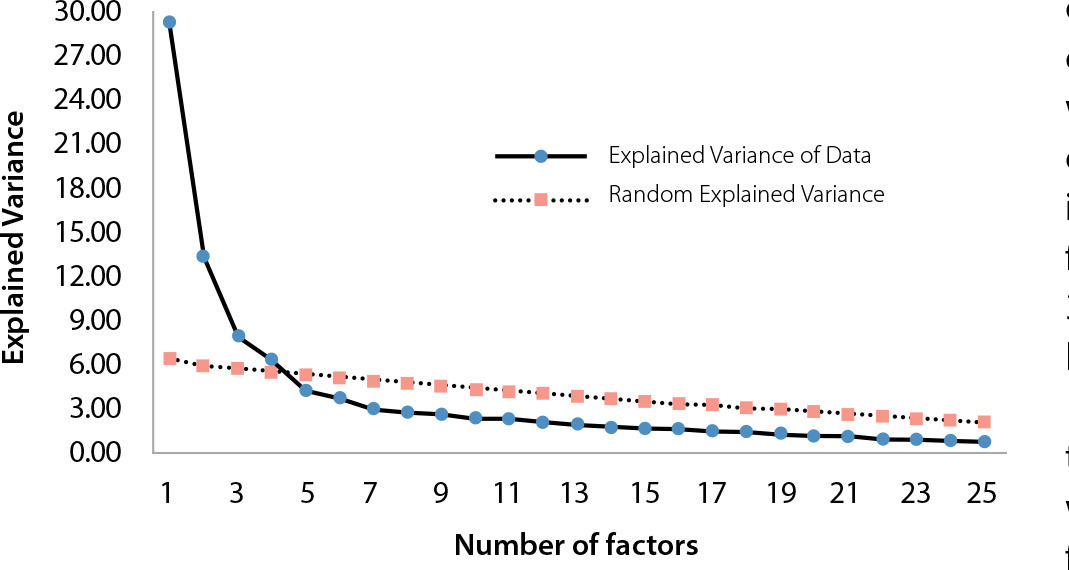
-
ORIGINAL ARTICLE07-29-2024
Nurses’ perspectives on nurses’ work methods
Revista Brasileira de Enfermagem. 2024;77(3):e20230374
Abstract
ORIGINAL ARTICLENurses’ perspectives on nurses’ work methods
Revista Brasileira de Enfermagem. 2024;77(3):e20230374
DOI 10.1590/0034-7167-2023-0374
Views0See moreABSTRACT
Objectives:
To analyze nurses’ perspectives on nurses’ work methods in the hospital context.
Methods:
A descriptive study with a qualitative approach was conducted in a hospital in northern Portugal, involving 17 nurses. Semi-structured interviews were used for data collection. Data collected between May and June 2023 underwent content analysis, supported by Atlas.ti software.
Results:
Three thematic areas emerged: “Nurses’ work methods in a hospital context,” highlighting the conception and components of work methods and the methods in use; “Implementation of nurses’ work methods,” emphasizing influencing factors and challenges to implementation; and “Impact of nurses’ work methods on patients, nurses, and institutions.”
Final Considerations:
Nurses’ work methods constitute the structure of nursing care. Some factors influence and some challenges arise in the implementation of these methods, producing impacts on patients, nurses, and institutions.

-
ORIGINAL ARTICLE07-29-2024
Nursing Process for institutionalized older adults: contributions from knowledge awareness workshop
Revista Brasileira de Enfermagem. 2024;77(3):e20230349
Abstract
ORIGINAL ARTICLENursing Process for institutionalized older adults: contributions from knowledge awareness workshop
Revista Brasileira de Enfermagem. 2024;77(3):e20230349
DOI 10.1590/0034-7167-2023-0349
Views0See moreABSTRACT
Objective:
To analyze the knowledge of professionals working in a Nursing Home about the Nursing Process before and after the awareness workshop.
Methods:
This is strategic action research, developed with nursing professionals and managers of a Nursing Home in Rio Grande do Sul, Brazil. Data were collected between January and June 2023, through semi-structured interviews before and after an awareness workshop. Discursive textual analysis of the data was carried out.
Results:
The central category “Understanding about the Nursing Process in Nursing Homes” emerged, which was unitized into two units of meaning and three categories of analysis.
Conclusion:
Data revealed non-use and lack of knowledge of the Nursing Process before awareness raising. Afterwards, a deeper understanding of the topic and its importance was identified. Awareness-raising workshops contribute to transformation of knowledge.
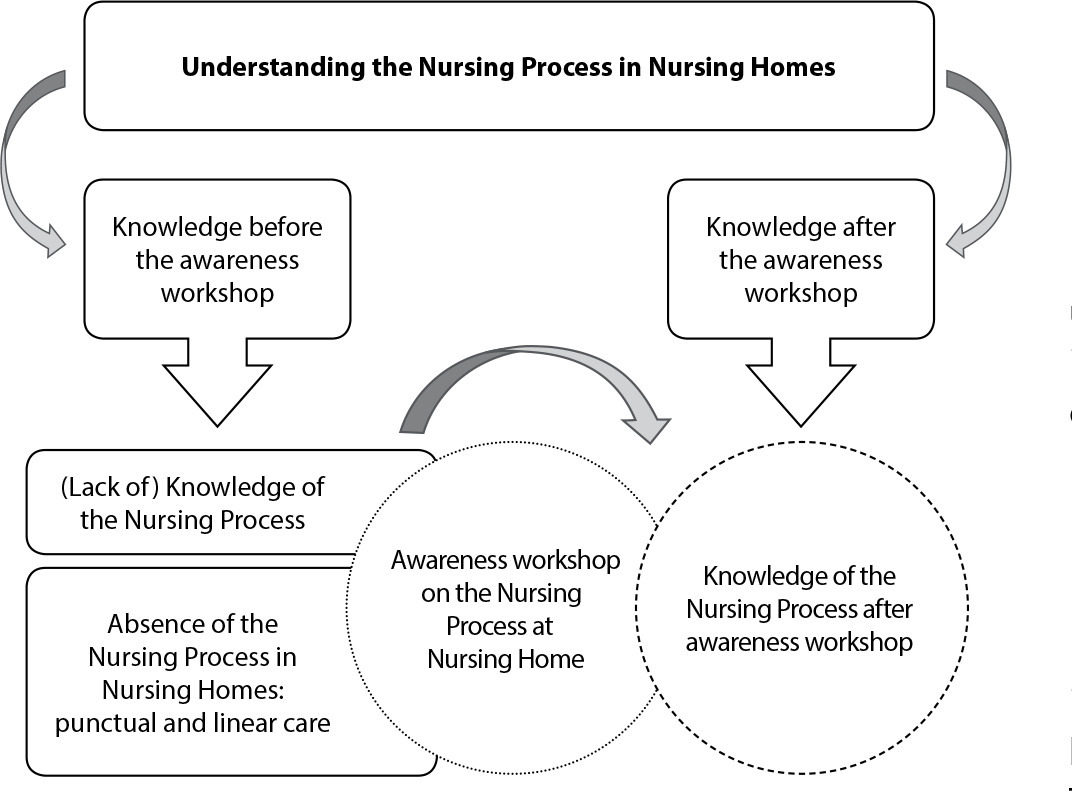
-
ORIGINAL ARTICLE07-29-2024
Excessive daytime sleepiness in nursing technicians: association with sleep quality and memory
Revista Brasileira de Enfermagem. 2024;77(3):e20230332
Abstract
ORIGINAL ARTICLEExcessive daytime sleepiness in nursing technicians: association with sleep quality and memory
Revista Brasileira de Enfermagem. 2024;77(3):e20230332
DOI 10.1590/0034-7167-2023-0332
Views0See moreABSTRACT
Objective:
to investigate excessive daytime sleepiness prevalence among nursing technicians and the association with sleep quality and memory.
Methods:
a cross-sectional, inferential study, carried out in a hospital unit in the state of Goiás between December 2020 and January 2021. Assessments were carried out using the Epworth Sleepiness Scale, the Pittsburgh Sleep Quality Index and the Prospective and Retrospective Memory Questionnaire, instruments validated for the Brazilian context. Bivariate and multivariate logistic regression analyzes were performed.
Results:
the sample consisted of 189 nursing technicians with a 40.9% excessive daytime sleepiness prevalence. In multivariate models, excessive daytime sleepiness was not associated with sleep quality, however there was a significant association with overall memory failures.
Conclusions:
study results demonstrate a high excessive daytime sleepiness occurrence, an association with overall memory failures and the need for psychosocial interventions for nursing technicians.
-
ORIGINAL ARTICLE07-29-2024
Educational technology for multidisciplinary training for managing waiting lists for elective patients
Revista Brasileira de Enfermagem. 2024;77(3):e20230299
Abstract
ORIGINAL ARTICLEEducational technology for multidisciplinary training for managing waiting lists for elective patients
Revista Brasileira de Enfermagem. 2024;77(3):e20230299
DOI 10.1590/0034-7167-2023-0299
Views1See moreABSTRACT
Objectives:
to construct and assess an educational technology for managing patient waiting lists for multidisciplinary training.
Methods:
study supported by Instructional Design – ADDIE model, whose stages of construction of educational technology were developed in the form of a multi-professional training course. Its respective content assessment was carried out by a committee of experts from 2021 to 2022. The analysis occurred based on the proportion of content adequacy with 95% Confidence Interval.
Results:
seventeen products were created as educational technology learning objects: five storyboards; four videos; three comic books; two pedagogical action plans; a mind map; and a YouTube® playlist. Nine experts assessed content adequacy, which reached 0.89.
Conclusions:
this educational technology contributes to the performance of professionals who manage waiting lists by reducing inequalities, alleviating differences, in addition to promoting equity in care and good health for patients in the Brazilian Health System.

-
ORIGINAL ARTICLE07-29-2024
Fuzzy Logic: vulnerability of women who have sex with women to sexually transmitted infections
Revista Brasileira de Enfermagem. 2024;77(3):e20230271
Abstract
ORIGINAL ARTICLEFuzzy Logic: vulnerability of women who have sex with women to sexually transmitted infections
Revista Brasileira de Enfermagem. 2024;77(3):e20230271
DOI 10.1590/0034-7167-2023-0271
Views0ABSTRACT
Objective:
To describe the possibility of applying Fuzzy Logic in analyzing the vulnerability of Women Who Have Sex with Women to Sexually Transmitted Infections/HIV/AIDS.
Methods:
We developed a Fuzzy Logic system with 17 input variables and one output variable, using data related to vulnerability in a municipality located in the Midwest region of the State of São Paulo, Brazil.
Results:
The factor with the greatest positive impact was the confirmation that a low understanding of Sexually Transmitted Infections/HIV/AIDS is associated with higher vulnerability. Conversely, the statement “Not disclosing sexual activity to healthcare professionals,” where individuals do not admit to having sex with women, had the least impact.
Conclusions:
Fuzzy Logic facilitates the identification of vulnerability, expressed through the analysis of interaction between variables in each dimension. This makes it a promising method to assist in analyzing the vulnerability of specific populations.
Keywords:Fuzzy LogicHealth VulnerabilityReproductive HealthSexually Transmitted DiseasesWomen Who Have Sex With WomenSee more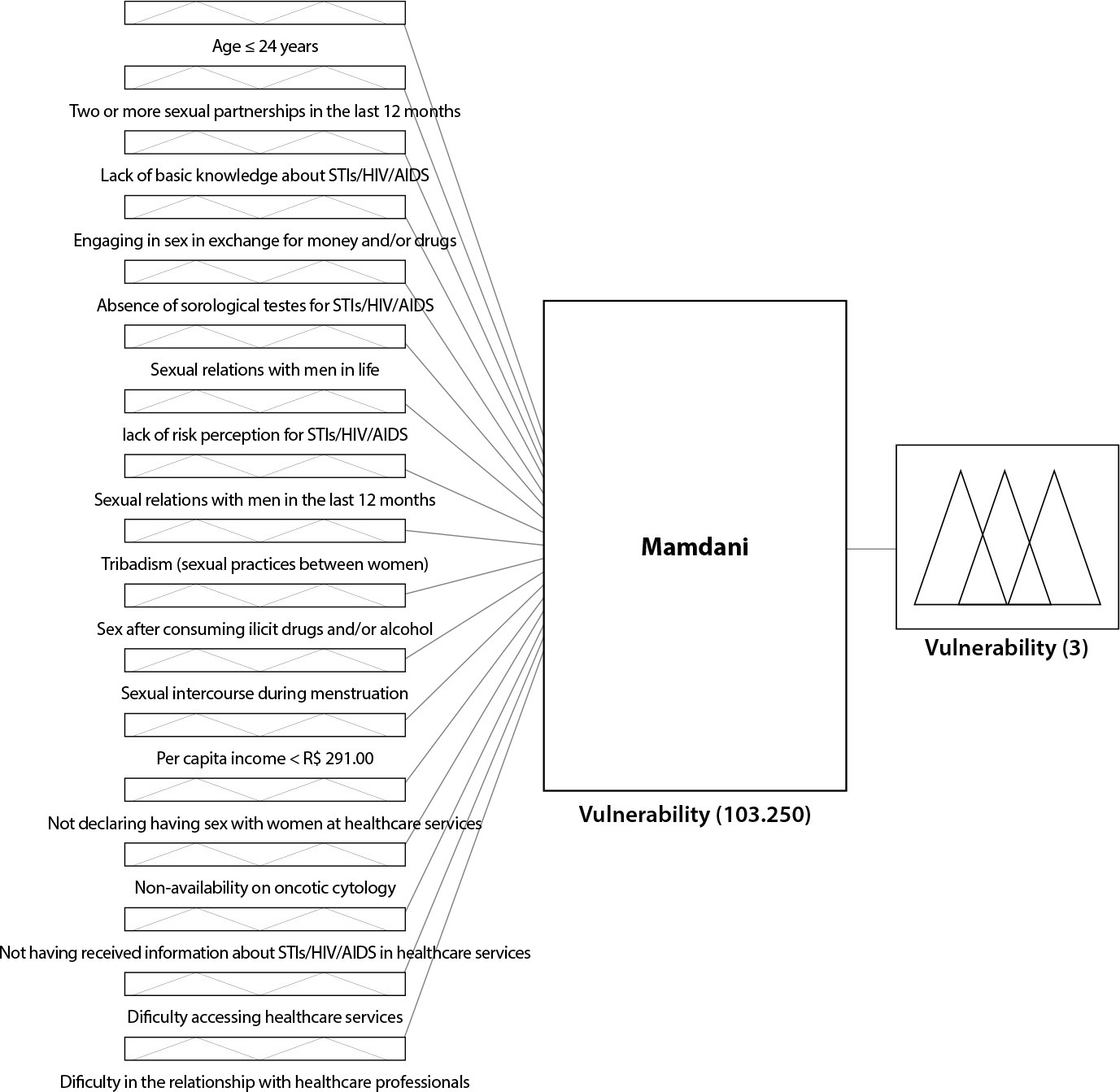
-
ORIGINAL ARTICLE07-29-2024
University Student Depression Inventory, Brazilian Version, Construct Assessment
Revista Brasileira de Enfermagem. 2024;77(3):e20230232
Abstract
ORIGINAL ARTICLEUniversity Student Depression Inventory, Brazilian Version, Construct Assessment
Revista Brasileira de Enfermagem. 2024;77(3):e20230232
DOI 10.1590/0034-7167-2023-0232
Views0See moreABSTRACT
Objectives:
to assess the University Student Depression Inventory, Brazilian version (USDI-BR), construct.
Methods:
a methodological study carried out with a snowball probabilistic sample, consisting of 334 undergraduate and graduate students. Confirmatory factor analysis, reliability using McDonald’s omega coefficient and Cronbach’s alpha were performed. Principal component analysis was performed using the varimax rotation and oblimin rotation, using the Kaiser-Meyer-Olkin criteria, Bartlett’s test of sphericity and scree plot.
Results:
the USDI-BR presented an internal consistency of items of ω = 0.95 and remained with 30 items, with the addition of 1 factor (Death wish and social withdrawal), totaling 4 factors.
Conclusions:
the USDI-BR has evidence that points to its validity and also its internal consistency, deserving that new studies be carried out to expand the evidence of its psychometric properties.
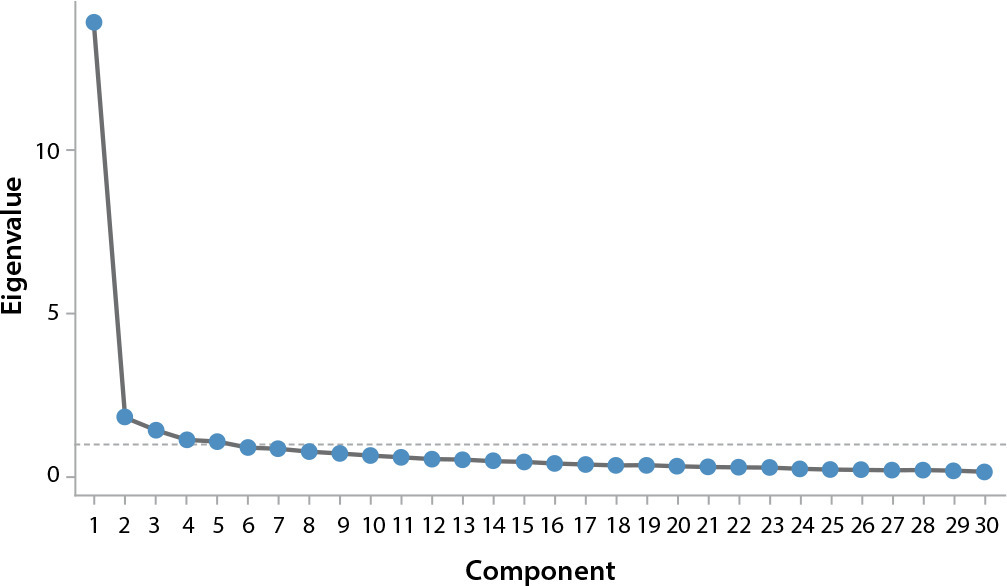
-
ORIGINAL ARTICLE07-29-2024
Family refusal of skin donation for transplantation: trends and associated factors
Revista Brasileira de Enfermagem. 2024;77(3):e20230209
Abstract
ORIGINAL ARTICLEFamily refusal of skin donation for transplantation: trends and associated factors
Revista Brasileira de Enfermagem. 2024;77(3):e20230209
DOI 10.1590/0034-7167-2023-0209
Views0See moreABSTRACT
Objectives:
to analyze the trends and factors associated with family refusal of skin donation for transplantation.
Methods:
this cross-sectional study was conducted in the State of São Paulo, with family authorization terms collected from 2001 to 2020. The variables analyzed included year, age, gender, cause of death, and type of institution. Data were analyzed using linear and multiple logistic regression, with the Odds Ratio estimated at p<0.05 for statistical significance.
Results:
1,355 individuals refused skin donation. The trend of refusals decreased between 2001 and 2009 in the age groups of 0-11 years and 12-19 years, but increased in the group aged ≥60 years. This trend continued to decrease in the 0-11 years group from 2010 to 2020, and increased in the 20-40 years group. Males and the age groups of 20-40 years, 41-59 years, and ≥60 years exhibited 27%, 34%, 47%, and 53% lower chances of refusal, respectively.
Conclusions:
there is an urgent need for measures to mitigate the high number of refusals associated with skin donation.
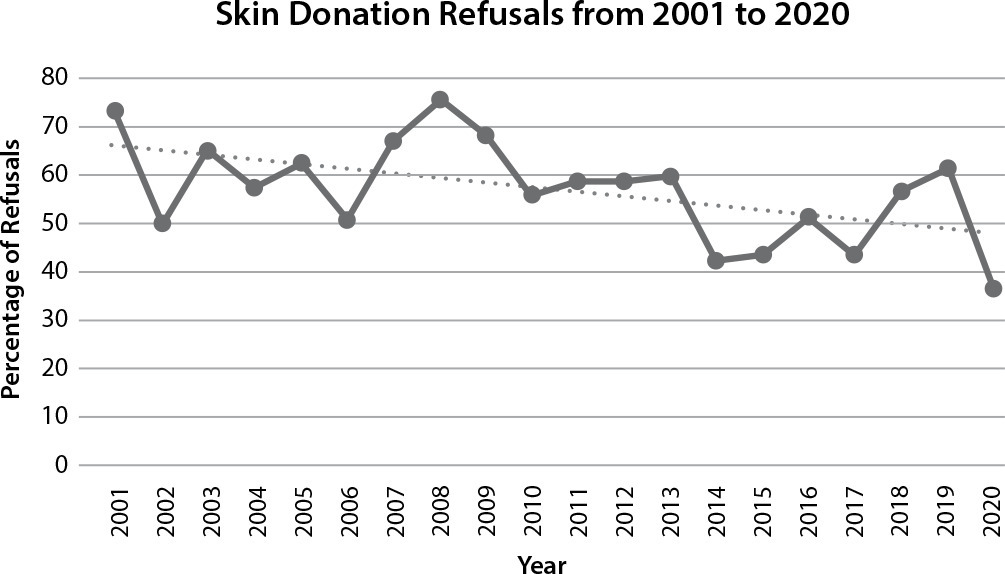
Search
Search in:
Nuvem de Tags
Aged (144) Atenção Primária à Saúde (239) COVID-19 (104) Cuidados de Enfermagem (269) Educação em Enfermagem (151) Educação em Saúde (139) Enfermagem (930) Estudos de Validação (131) Health Education (144) Idoso (208) Mental Health (149) Nursing (987) Nursing Care (306) Patient Safety (151) Primary Health Care (284) Qualidade de Vida (104) Quality of Life (106) Saúde Mental (145) Segurança do Paciente (150) Validation Studies (108)



